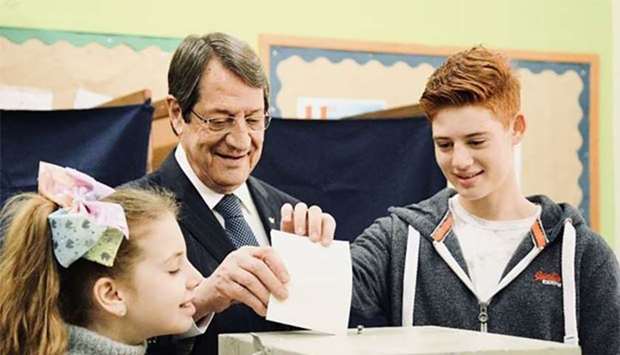Voters in Cyprus headed to the polls on Sunday for a presidential election that could determine if the divided Mediterranean island makes another push to reunite after the collapse of talks last year.
After a lacklustre race, opinion polls put conservative incumbent Nicos Anastasiades, 71, ahead as he pledges to restart negotiations with the Turkish-backed north quickly after the vote.The former lawyer -- under the slogan "Steady Steps Forward" -- has taken credit for an impressive recovery by the European Union's most easterly member since a debilitating financial crisis in 2013.
But apathy appears to be high and Anastasiades seems unlikely to win outright in the first round.
He is expected to face a February 4 run-off against either dovish Communist-backed Stavros Malas or Nikolas Papadopoulos, a former president's son who takes a tougher line on peace efforts.
"The economy is doing reasonably well -- but for me the main criterion is still the Cyprus problem," said university lecturer Andres Karageorghis after voting at a school in Nicosia.
"To carry on and hopefully find a solution."
If the first round is not decisive, intense horse-trading will follow, and analysts say a backroom deal between Anastasiades' opponents could still deny him a second and final five-year term.
"The candidates had the opportunity to put their positions and arguments," Anastasiades said after voting in his home town of Limassol.
"What I ask is for everyone to act with sobriety."
At 3:00 pm the official nationwide turnout was 50.9% compared with 61.35% at the same time in 2013.
As always, the nearly 44-year division of the island between the internationally recognised Greek-majority Republic of Cyprus and a Turkish Cypriot statelet in the north looms large.
In July, two years of UN-backed talks between Anastasiades and Turkish Cypriot leader Mustafa Akinci came closer than ever to reunifying the island but then collapsed in acrimony.
Despite the failure to bridge key issues, including the future of tens of thousands of Turkish troops in the north, Anastasiades insists he wants talks with Akinci to restart soon.
But there is deep scepticism internationally over whether the political will for a breakthrough exists.
During the campaign, Anastasiades was attacked for being either too pliant or not keen enough to seal a deal.
"Today it is not the candidates who are the protagonists but the citizens," challenger Papadopoulos, who urges a tougher stance, said after voting.
"With their choices, they determine the future of our homeland. For a solution with a new strategy, to restore the middle class, for change and reliability."
Retired treasury worker George Georgallides said he voted for the more hardline candidate because he felt "Anastasiades gave up everything" at last year's negotiations.
"If we do restart talks then it needs to be from the very beginning again," he said.
Signs are that the road to reunification will only get tougher as fatigue mounts after decades of failure.
For the first time ultra-nationalist party ELAM -- fiercely opposed to the proposed reunification -- is fielding a candidate.
While the "national problem" is ever present, this time around the economy has been a dominant issue.
When Anastasiades became president, the banking sector was in meltdown and he took a €10bn (more than $12bn) bailout that entailed biting austerity measures.
That included a drastic "haircut" on accounts of more than €100,000 held in the country's largest lender, Bank of Cyprus.
Since then, the economy has rebounded faster than many people expected, and growth has been steady since 2015.
Tourism reached a record high last year and explorations are going on for oil and gas deposits offshore.
Analysts warn there are still major challenges, however.
The economy is still smaller than it was before the crisis, unemployment is around 11% and banks are awash with bad loans.
"The recovery is relative," said Fiona Mullen, director of Cyprus-based Sapienta Economics.

